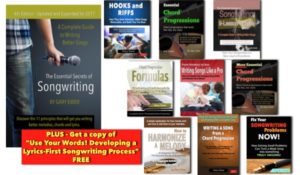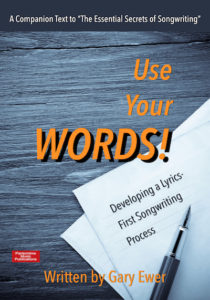If you have a notebook (literal or virtual) full of half-written songs, and can’t seem to finish anything you start, you can at least take comfort in knowing that most songwriters start far more songs than they finish.
The problem with an unfinished song is that it looks for all the world like a failure, when in fact it may simply be a small bit of something waiting for the right other bit to make it complete.
But if that notebook is full of bits of unfinished music and you’ve got little to show for completed songs, you’re no doubt dogged by that nagging thought: “I can’t finish any song that I start. What’s causing that, and what can I do?”
 Get “The Essential Secrets of Songwriting” eBooks. They’ll help you polish your technique, and make you the best songwriter you can be. Comes with a Study Guide, tons of chord progressions, and information covering every aspect of how to write good music.
Get “The Essential Secrets of Songwriting” eBooks. They’ll help you polish your technique, and make you the best songwriter you can be. Comes with a Study Guide, tons of chord progressions, and information covering every aspect of how to write good music.
If a song takes a long time to finish, that isn’t an indication that you’ve got a problem with your process. Sometimes that’s just how it is. But if nothing is working, it may be a simple matter of trying too hard to emulate your songwriting hero.
If you love Springsteen, for example, and you’re using his music as your example of what a good song should sound like, you’ve set yourself a high standard. There’s nothing wrong with that, but it might be better, particularly if you’re new to the world of songwriting, to determine to write within your means.
What does writing within your means look like? And how does that lead to more success for you? It usually means any or all of these:
- Keep instrumentation simple and transparent. Stick with what you know and what you’re good at.
- Keep chords from straying too far into the world of harmonic complexity. Complex songs usually have a simple structure as its core anyway.
- Make sure lyrics are well-structured, moving back and forth between observational/narrative (in the verse), and emotional (in the chorus).
- Remember that complexity does not need to equate to “weird.” A complex lyric, for example, does not need to use complicated or convoluted concepts. A great example is Paul Simon’s “Mrs. Robinson“, where line by line, there’s nothing bizarre about the lyric. The complexity comes from what it all means when you consider it all together.
- Keep song forms clear and unambiguous. Most of the time you can get away with having an initial plan to write a song that uses a simple verse-chorus format. There’s no need, at the outset, to struggle over not knowing what the pre-chorus should be, when you don’t even know if it’s necessary.
The main thing to take away from those five points is this: simplicity is almost always better than complexity. And some of the most complex songs, as mentioned, have simplicity at their core. I love “And You And I” by Yes for the complexity of the form. But at its core is gorgeous simplicity. I hope you give it a listen — a lovely montage of simple ideas layering on top of each other.
Don’t ever worry that your songs might sound simple. If you’re wanting more complexity, writing good simple songs is the first vital step. Get something simple working, and complexity will naturally follow if that’s what you’re ultimately looking for.
And until that happens, write within your means. Keeps things simple, direct, and well-structured.
 Written by Gary Ewer. Follow Gary on Twitter.
Written by Gary Ewer. Follow Gary on Twitter.
 The Essential Secrets of Songwriting 10-eBook Bundle comes with a free 11th eBook: “Use Your Words! Developing a Lyrics-First Songwriting Process.” Start putting your lyrics front & centre!
The Essential Secrets of Songwriting 10-eBook Bundle comes with a free 11th eBook: “Use Your Words! Developing a Lyrics-First Songwriting Process.” Start putting your lyrics front & centre!










